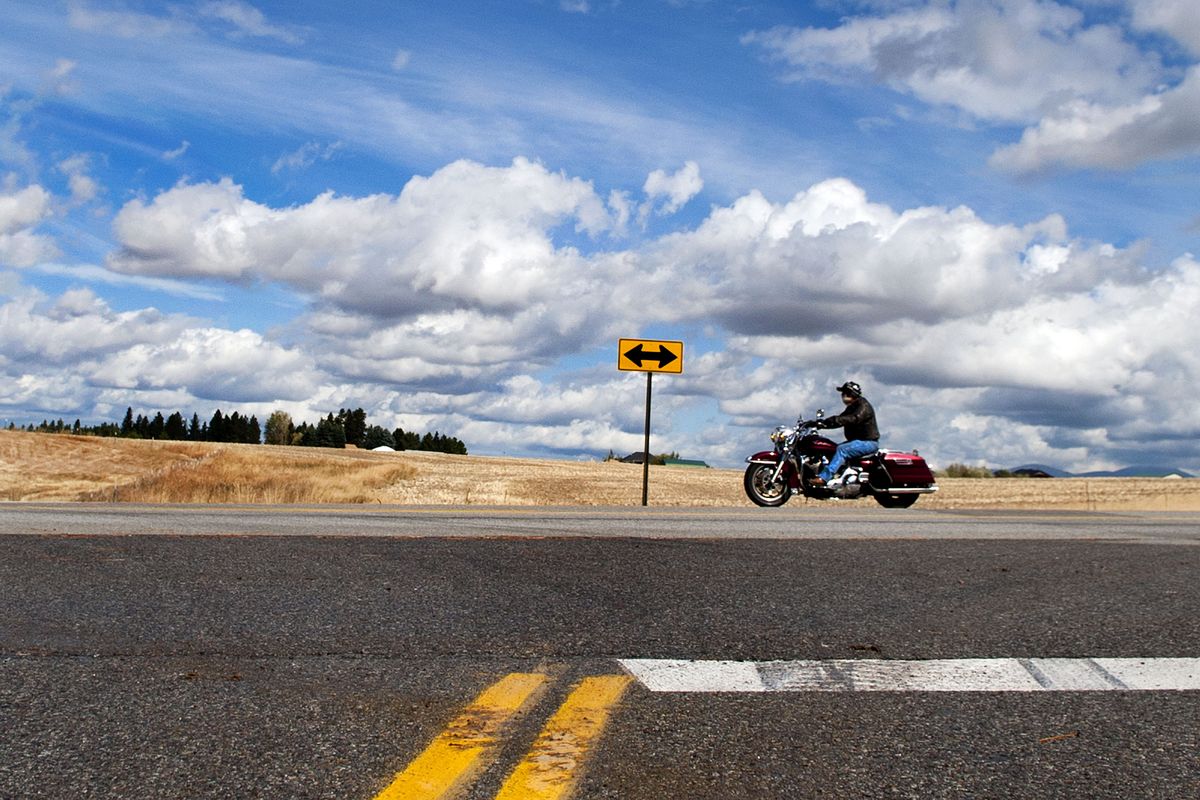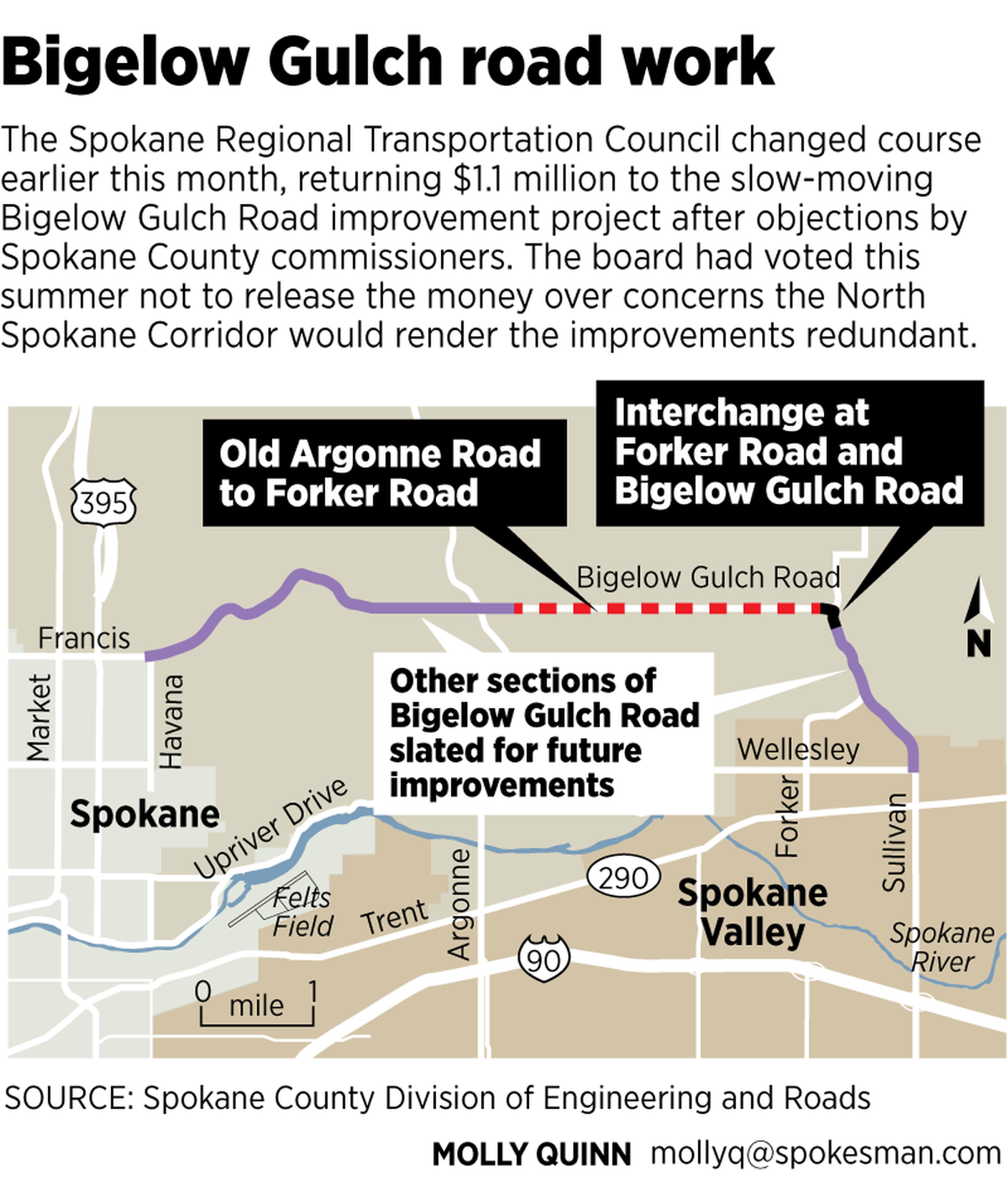Council approves $1.1 million for Bigelow Gulch Road project
A motorcyclist drives past Old Argonne Road on Bigelow Gulch Road on Monday. (Kathy Plonka)Buy a print of this photo
The long-delayed project that would add additional lanes to Bigelow Gulch Road will get $1.1 million in federal funding after all.
Spokane County commissioners pushed for the money after stakeholders voted against the allotment in July. The county wants to build a four-lane highway to ease freight congestion and increase safety on the road after several fatal collisions.
“It’s a community priority,” Spokane County Commissioner Todd Mielke said.
Not everyone on the Spokane Regional Transportation Council agreed with the numbers used to justify the project, particularly after the Legislature set aside $879 million in gas taxes to build the north Spokane freeway. Those skeptics, including Spokane City Councilman Jon Snyder, say more people will take the new freeway, cutting down on the need for Bigelow Gulch improvements.
The Bigelow Gulch project, first proposed in the mid-2000s, was put on hold by the Federal Highway Administration after it found the county had acted inappropriately in acquiring land to serve as right of way along the connector, which runs from Freya Street to Forker Road north of Spokane Valley.
The transportation council voted 6-5 in July not to commit the full $1.4 million in federal funding the project was eligible for before the right-of-way issues arose, instead granting the project just $237,000 for an interchange at Bigelow Gulch and Forker. They wanted additional information from Spokane County engineers before committing to the full amount. When county engineers came back with additional traffic data this month, the transportation council reversed its position, approving full funding for the project by a 10-3 vote. Snyder, Spokane City Council member Amber Waldref and Spokane Valley City Councilman Ben Wick voted against the proposal.
The decision pushes Bigelow Gulch to the head of a line of regional road projects waiting to receive a limited pot of federal money. Snyder said that was unfair.
“I thought that was really a severe breach of process, with no good reason,” he said.
Mielke, of the county commission, said the main reason for pushing the Bigelow Gulch project is safety. But Snyder said he thought building out the freeway was the first step to promoting urban growth in the area.
“This is just a sprawl project, through and through,” Snyder said. He added that if the county wants the new lanes, it should have to pay for it on its own through higher taxes – something commissioners have been unwilling to do, he said. The project also received no support from the Legislature and was excluded from the state transportation budget, Snyder said.
Mielke called Snyder’s comments on growth “absolutely ridiculous” and “naïve.” He said the county tried to develop a public funding district to raise taxes for the project, but Spokane Valley balked at the idea. The road is used by residents throughout the county, he added.
“Bigelow Gulch is the primary corridor for people who go to Green Bluff,” Mielke said. “Are you telling me that city residents don’t go up to Green Bluff?”
As a result of the transportation council’s decision to use the federal money for Bigelow Gulch, the county dropped its request for federal money to make improvements to Brooks Road, just outside of Medical Lake city limits. The shifting of funds also means less guaranteed money to resurface Washington Street in Cheney, the main artery to Roos Field.
The council chose to designate the Washington Street project as the top priority to receive surplus funding if other projects come in under budget. Cheney Mayor Tom Trulove said he was confident, based on the amount of money returned in years past, that the Washington Street project would receive full funding.
“It’s a lot less political than it was in the past,” Trulove said of the council’s funding process. “Now, there are specific criteria that are applied to each project.”
Trulove changed his vote from July, approving the Bigelow Gulch money with the condition that the Washington Street repaving would receive top billing for reserve money. Without that assurance, Trulove said, Cheney would not be able to repave the arterial road.
Also looming is a legal challenge of the Bigelow Gulch project, alleging federal authorities did not conduct a rigorous enough environmental review before greenlighting it in 2008. Rick Eichstaedt, with the Center for Justice, is representing a neighborhood group that is appealing a federal judge’s order allowing the project to move forward.
The group says the project will disrupt area wetlands and that a higher standard of environmental review should have been conducted.
Eichstaedt said the case would likely come up for a hearing before federal appeals court judges early next year. Mielke said he anticipated some work on the Forker interchange could begin as early as next year, barring legal challenges.

